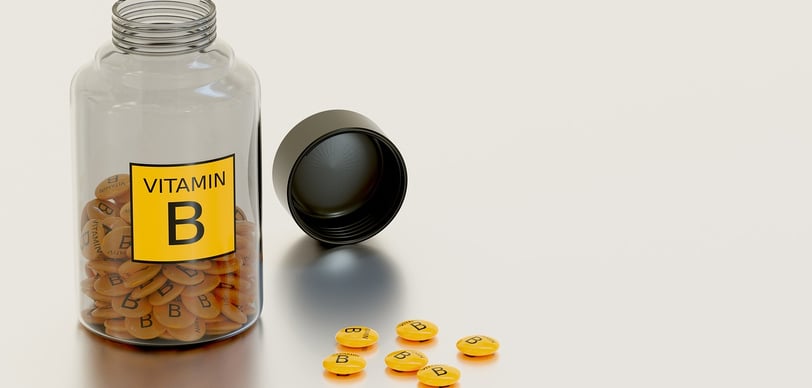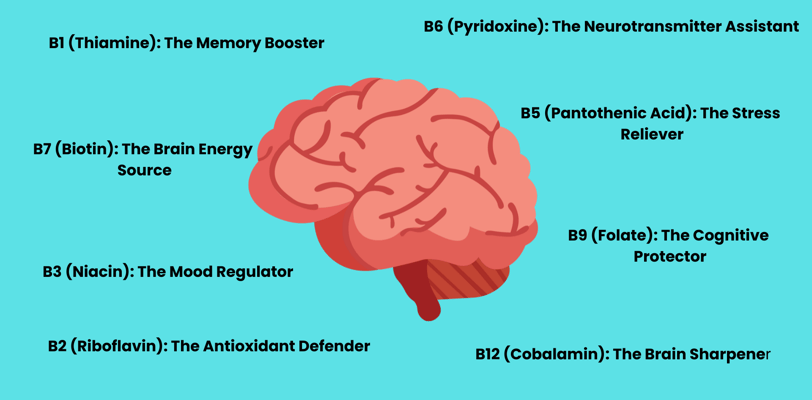B Vitamins for Brain Power: Improve Memory, Mood, and Focus
NUTRITION & DIET


our brain is a powerhouse. It controls your thoughts, memory, emotions, and even how your body moves. But to keep it functioning at its best, your brain needs the right nutrients—especially B vitamins.
B vitamins play a vital role in brain health, influencing everything from cognitive function to mood regulation. Without enough of them, you may experience brain fog, low energy, and even an increased risk of neurodegenerative diseases.
Let’s break down why these essential vitamins are crucial for your brain and how you can ensure you’re getting enough of them
Why B Vitamins Matter for Your Brain
B vitamins help your brain function optimally by supporting neurotransmitter production, energy metabolism, and DNA synthesis. They also protect against oxidative stress and inflammation—two factors that can contribute to cognitive decline.
There are eight B vitamins, each with a unique role in brain health. Here’s how they contribute:
1. B1 (Thiamine): The Memory Booster
Thiamine is essential for converting food into energy. Your brain consumes a lot of energy, and without enough thiamine, you may experience mental fatigue and memory issues.
Studies suggest that a deficiency in thiamine can lead to cognitive decline and even contribute to conditions like Alzheimer’s disease. Foods rich in thiamine include beef, pork, chicken.
2. B2 (Riboflavin): The Antioxidant Defender
Riboflavin acts as an antioxidant, helping to reduce oxidative stress in the brain. It also supports energy production and can help prevent migraines.
Good sources of riboflavin include dairy products organ meats, eggs, and leafy greens.
3. B3 (Niacin): The Mood Regulator
Niacin is crucial for brain cell repair and DNA production. It also helps reduce inflammation, which is linked to depression and cognitive decline.
Foods high in niacin include meat, poultry, fish, peanuts, and mushrooms.
4. B5 (Pantothenic Acid): The Stress Reliever
This vitamin plays a role in producing coenzyme A, which is essential for synthesizing neurotransmitters like dopamine and acetylcholine. These chemicals help regulate mood and memory.
You can find B5 in avocados, eggs, meat, and seafood.
5. B6 (Pyridoxine): The Neurotransmitter Assistant
B6 is crucial for producing serotonin and dopamine—neurotransmitters that influence mood and mental clarity. A deficiency in B6 is often linked to depression and anxiety.
Foods high in B6 include bananas, potatoes, chicken, and tuna.
6. B7 (Biotin): The Brain Energy Source
While biotin is often associated with hair and nail health, it also supports brain function by aiding in glucose metabolism. Your brain relies on glucose for energy, making biotin a key player in cognitive function.
Sources of biotin include nuts, seeds, and egg yolks.


7. B9 (Folate): The Cognitive Protector
Folate is essential for DNA synthesis and the production of neurotransmitters. It’s particularly important for pregnant women because it helps prevent neural tube defects in developing babies.
Low folate levels are linked to cognitive decline and an increased risk of depression. You can get folate from leafy greens, lentils, beets, and eggs.
8. B12 (Cobalamin): The Brain Sharpener
B12 is essential for maintaining the myelin sheath—a protective layer around nerves that allows for efficient communication between brain cells. A deficiency in B12 can lead to brain fog, memory loss, and even dementia.
B12 is primarily found in animal products like meat, dairy, and eggs, so vegetarians and vegans may need to supplement.
Signs of B Vitamin Deficiency
Since B vitamins are water-soluble, your body doesn’t store them for long. This means you need to consume them regularly to prevent deficiencies.
Some common signs of B vitamin deficiencies include:
Brain fog
Fatigue
Depression or anxiety
Memory problems
Numbness or tingling in hands and feet
Mood swings
If you experience these symptoms, it may be worth checking your B vitamin levels.


How to Get Enough B Vitamins
The best way to ensure you’re getting enough B vitamins is through a balanced diet. Eating a variety of whole foods can help cover your bases. Here are some simple ways to boost your intake:
Eat More Whole Foods: Meat, fish, eggs, dairy, and leafy greens are excellent sources of B vitamins.
Include Animal-Based Foods: Meat, fish, and dairy provide B12, which is difficult to get from plant-based sources.
Consider a Supplement: If you have dietary restrictions or absorption issues (such as those caused by digestive disorders), a B-complex supplement may be helpful.
The Link Between B Vitamins and Mental Health
Research has shown a strong connection between B vitamins and mental health. Deficiencies in B6, B9, and B12, in particular, have been linked to depression and cognitive decline.
B vitamins help regulate homocysteine levels, an amino acid that, in high amounts, is associated with an increased risk of Alzheimer’s and heart disease. Keeping homocysteine levels in check is one reason why maintaining proper B vitamin intake is crucial for long-term brain health.
Final Thoughts
Your brain depends on a steady supply of nutrients to function at its best, and B vitamins are among the most important. From improving memory and focus to supporting mental health, these essential nutrients play a key role in keeping your brain sharp and resilient.
By prioritizing a diet rich in B vitamins, you can enhance cognitive function, boost your mood, and protect your brain from age-related decline. If you suspect a deficiency, talk to a healthcare professional about dietary changes or supplementation.
Give your brain the fuel it needs—because a well-nourished brain is a thriving brain!
